The Transport Division is headed by Deputy General Manager (Transport), and he is assisted by Chief Manager (Traffic). Our entire operation is divided into 27 depots, and all these depots are placed in zones. The Dy. Chief Managers (Traffic) are zonal in-charge, who are assisting the Chief Manager (Traffic). The Depot Managers are heading each Depot. Dy. Depot Managers, Asst. Depot Managers, Sr. Traffic Officers, Traffic Officers, Assistant Traffic Officers and Administrative Officers assist the Depot Managers. This team of officers directly controls the operational and administrative activities of the respective Depot. Apart from this team, the supervisory category viz. Bus Inspectors, for plugging the leakage in revenue, Starters for controlling the bus operation etc., are appointed at depots. Each depot is provided with a wireless vehicle, which is used to monitor the operation of buses in the jurisdiction of the depot.
TRAFFIC CONTROL ROOM:
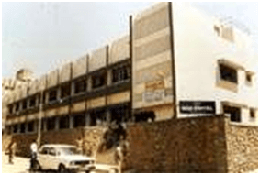
The Bus Running Control (BRC) Officer mans the Traffic Control Room, round the clock. The section is provided with VHF sets connecting all the depots as also the Police Control, Traffic Police Control, Railways etc. This officer regulates the entire operation smoothly with the help of the Divisional Officers, by being in touch with them through wireless sets.
BUS CONTROL ROOM:
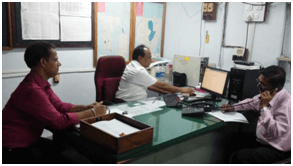
The Bus Control Section functions round the clock, to attend to the vehicle breakdowns on field. The total operational area is divided into zones and emergency breakdown vans are provided for each zone. These vehicles are provided with necessary spares/units so as to carry out emergency repairs on the field itself. For speedy communication these vehicles are equipped with VHF sets.
TRAFFIC TRAINING CENTER:

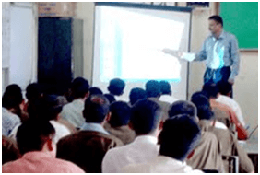
The BEST has established a Training Center, to provide training and refresher courses to the operating crew members. On line training to new bus drivers is also provided with the help of training vehicles. At the depots our Accident Prevention Training Vehicle, is making rounds and counseling the operating staff about safe driving habits.
TICKET & CASH DEPARTMENT:
The Ticket and Cash Department collects the daily revenue earned at the depots. The same is counted, consolidated, and remitted in the banks. Inventory of ticket blocks to be issued to the conductors, is also maintained by the Ticket & Cash Department.
ACCIDENT & CLAIMS SECTION:
The Accident and Claims Section, as the name suggests, is established for settling the claims of personal injury / death due to accident involving our buses. Also various programs on Road Safety / Passenger Safety, to create awareness amongst the operating staff, passengers, pedestrians, and school children, are organized by this section in co-ordination with Training Center.
TRAFFIC PLANNING SECTION:
The Planning Section is established to prepare the schedules for different routes. An exercise in revision of schedules is periodically carried out after taking into consideration the guidelines given by the Management, suggestions received from the Divisional Officers and also from our valued commuters. The schedules are revised after every four months. Uneconomic routes are discontinued and the financial viability of the routes is appraised both at depot level as also at the Head Quarter level.
The routes operated by the BEST can be broadly classified in the following categories.
The primary role of the BEST is to supplement Suburban Rails, which is the mass carrier. It is for this reason that BEST always gives priority for feeder routes and thereafter for East-West connectors where the railways have absolutely no direct role to play. The third priority is the long distance trunk route, which is an alternative to Suburban Railways, apart from being inter-corridor link between Suburbs and City.
The BEST always gets suggestions for introducing new routes. These suggestions are categorised into the above mentioned groups.
While introducing the bus operation on any new road the following requirements are ensured for maintaining the quality of service.
- The road is Municipalised
- The road is Bus worthy and wide enough to allow the passage of two vehicles at a time
- There are no overhead obstructions in the form of cables/tree branches
- There are enough streetlights
- Manoeuvering is comfortable and there are no blind corners
- There is a good turning circle at the terminating point for reversing the buses
At this stage it is necessary to state that when every commuter desires a direct connection, he should realise that it is not always possible to inter connect every point with a direct route. One change is absolutely inevitable in any city transport network. Inspite of this the BEST tries to provide a direct connection wherever absolutely required but specific access to some areas is available with one changeover. For convenient changeovers, the Undertaking has introduced Bus Pass Scheme, and �Daily Travel As you like� passes. With these passes the commuter can easily changeover on parallel routes, and can enjoy multiple journeys.
SALIENT FEATURES OF THE TRAFFIC OPERATIONS
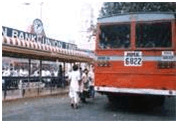
The BEST
operates buses with Zero Waiting Time concept on different routes during the Morning and Evening peak
hours to have faster clearance of heavy passenger traffic outside Railway Stations and major residential/commercial/CBD Areas.
The BEST ensures that a bus is always waiting for a passenger rather than having it the other way round. The plan is
designed keeping in mind the volume/period of traffic with a view to encourage use of Public Transport and discourage
use of private and Intermediate Personal Transport modes like Taxis and Autorickshaws. The important points of operation
are Bhatia Baug, NCPA, World Trade Center, etc.
OPERATION OF MIDI BUSES:
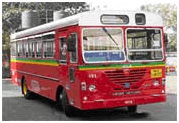
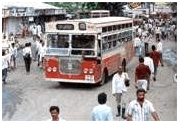
The areas in which it was not possible for the BEST to operate the conventional buses due to narrow roads, the BEST has introduced Midi Buses at such places. It thus goes on with its ultimate aim of providing a BEST bus service to every nook and corner of the city.
EXCURSION SERVICE
BEST in collaboration with the Maharashtra Tourism Development Corporation, has introduced a special heritage tour with effect from 26th January 1997 , in an Open Deck Bus in South Mumbai .
GROUND BOOKING:
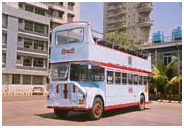
For the convenience of the passenger the Undertaking has implemented ground booking scheme at the prominent locations during peak hours.
OPERATION BEYOND MUNICIPAL LIMITS:
The BEST operates inter-city services to three different areas beyond the Municipal limits of Mumbai city, i.e. into the limits of the bordering corporations. The three areas are as follows:
Transport is the lifeline of any city, and BEST being the monopoly stage carriage Operator of this great Metro, it becomes the prime duty of BEST to ensure the development of the satellite townships by providing a proper transport network. No city or township can develop, if the Transportation, and Communication network is not proper and it is here that the onus of developing a transport network falls on the BEST.